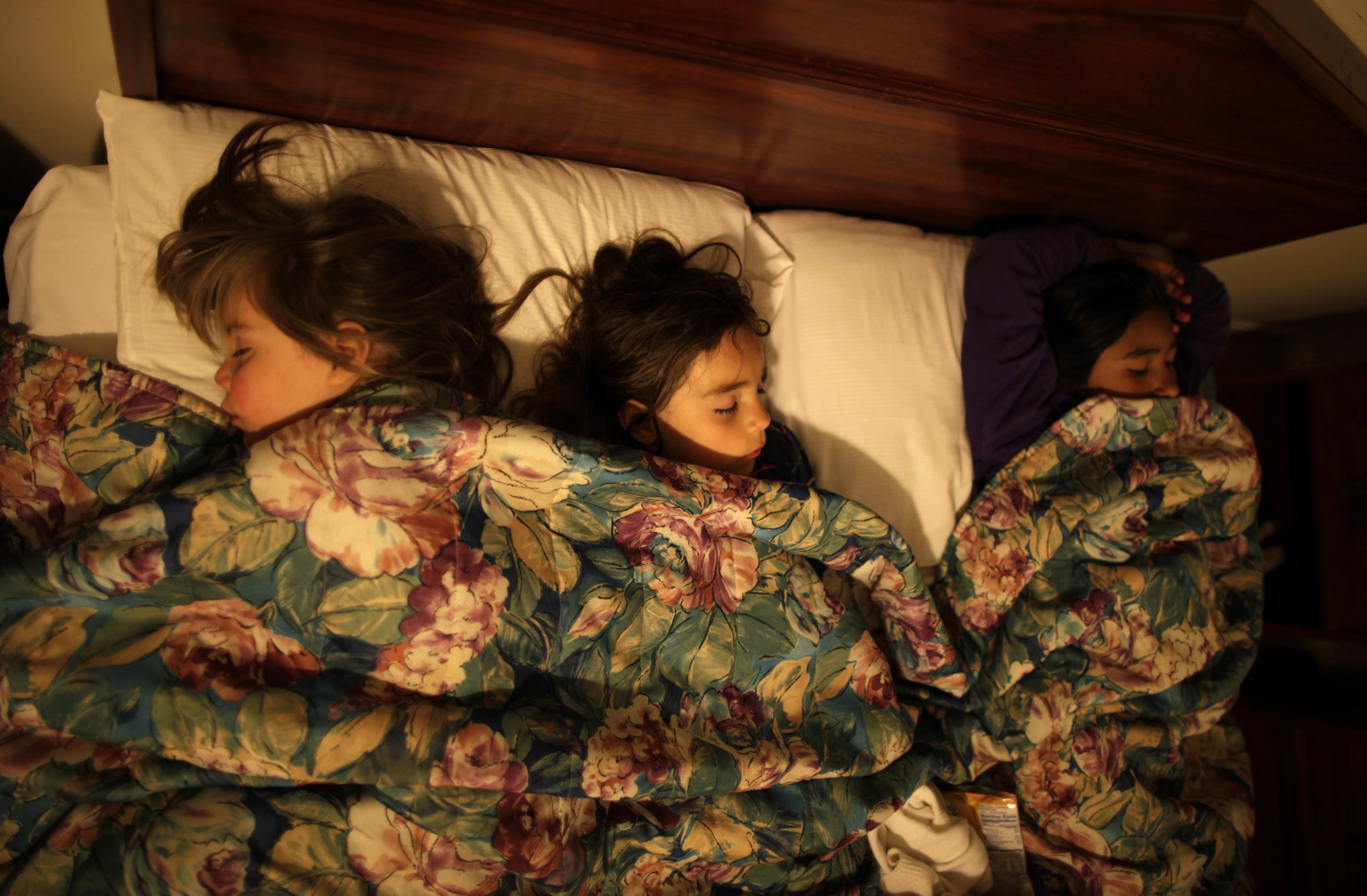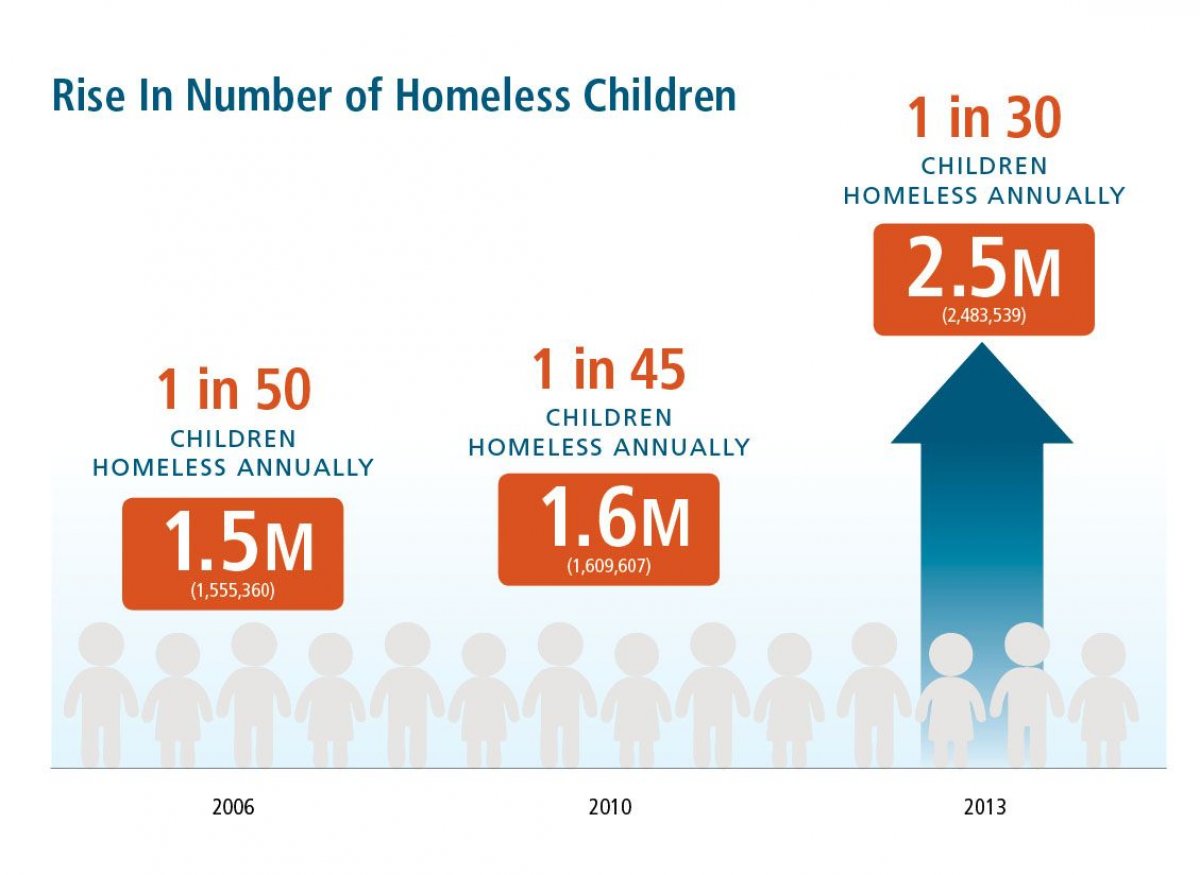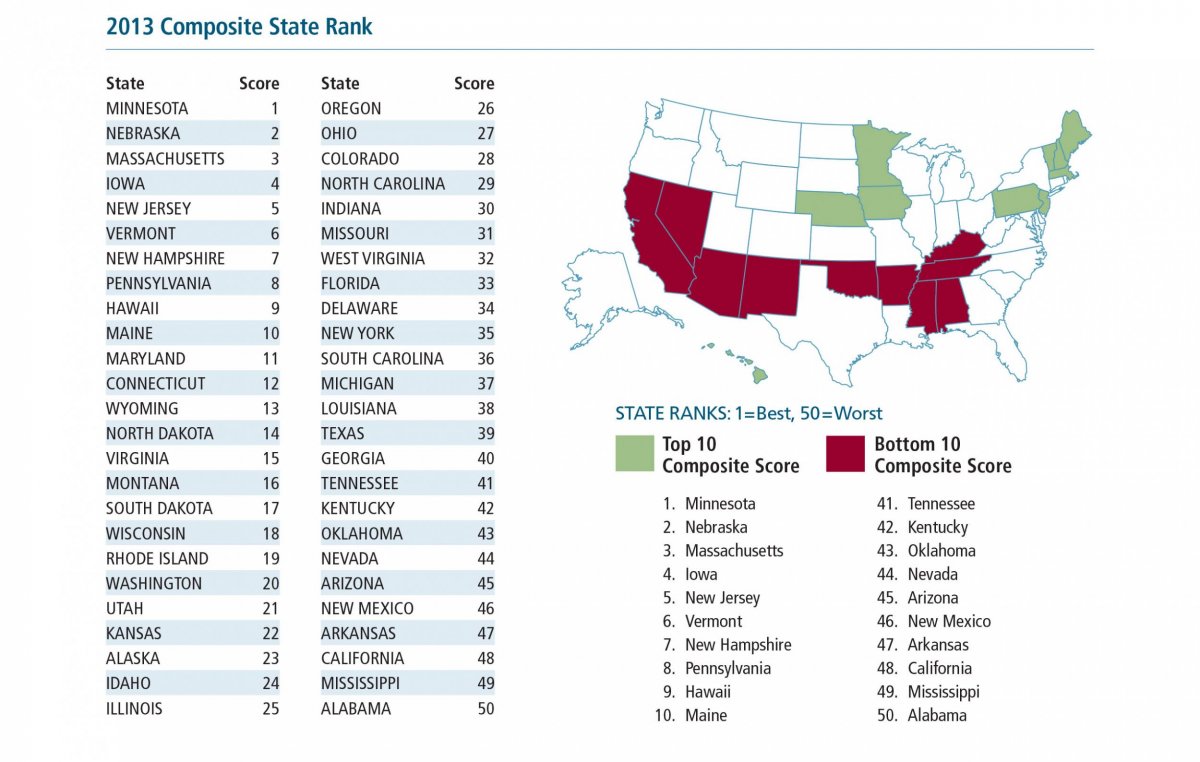
One out of every 30 children in the U.S. experienced homelessness last year. That makes nearly 2.5 million children who, in 2013, lived in shelters, on the streets, in cars, on campgrounds or doubled up with other families in tight quarters, often moving from one temporary solution to another, according to "America's Youngest Outcasts," a report published Monday by the the National Center on Family Homelessness at the American Institutes for Research.
With an increase of 8 percent in just one year between 2012 and 2013, the number of homeless children in this country has reached a historic high, the report says.
"As a nation of wealth and opportunity [one in 30 children] is not something we should tolerate," Carmela DeCandia, director of the National Center on Family Homelessness, tells Newsweek. "We haven't been paying attention," she says, and "we need to before the goal becomes out of reach."
In 2010, the U.S. Interagency Council on Homelessness presented a plan called Opening Doors, which stated as goals ending chronic and veteran homelessness by 2015, and getting rid of of children, family and youth homelessness by 2020. The report released Monday says that while the government has taken steps to tackle the first half of its goal and successfully reduced the number of chronically homeless individuals and homeless veterans, "children and families have not received the same attention—and their numbers are growing."

The report, which draws on data from the U.S. Department of Education (DOE) as well as the Census Bureau, found that children are homeless in every county and state across the country, in rural areas, towns, and major cities, DeCandia tells Newsweek. Numbers in cities like Los Angeles, San Francisco, and New York are high, she says, but rural homelessness is also a problem, in areas where support services may be more difficult to access. Researchers found that a majority of the families counted consisted of a young single mother with two children, usually under the age of 6.
The number of homeless children increased in 31 states between 2012 and 2013, with leaps of 10 percent or more in 13 states and Washington, D.C. While the researchers expected to see an increase, "how much of an increase was the most alarming fact," says DeCandia. "It's really reached an epidemic proportion."
California, Alabama, and Mississippi came in at the bottom of the pack in the report's ranking of states based on the extent of child homelessness, child well-being, risk for child homelessness, and state policy and planning efforts. Minnesota, Nebraska and Massachusetts topped the list at the other end of the spectrum.

The report identifies six major causes contributing to the unprecedented rate of child homelessness: high poverty rates, lack of affordable housing, racial disparities, challenges of single parenting, domestic violence and other traumatic experiences, and the lingering effects of the recession. These highly vulnerable groups are still suffering from the recession's effects, according to DeCandia.
"Children are kind of like the canaries in the coal mine," Bruce Lesley, president of First Focus Campaign for Children, tells Newsweek. They are "the first to be negatively affected by recessions and the last group to recover." Often their parents are relatively young, Lesley explains, and the last ones to benefit from a recovering economy.
The poorest families haven't yet seen the benefits of the recovery, Barbara Duffield, director of policy and programs at the National Association of State Coordinators for the Education of Homeless Children and Youth, agrees. Her organization is made up of school district liaisons appointed to help identify homeless children, train everyone from teachers to bus drivers and cafeteria workers to do the same, and help provide support services.
In the short term, homeless children are hungry and sick more often, and worry about their family's situation and future, according to the report.
"They're not just losing a house, a shelter. They're losing their sense of place, of community," DeCandia tells Newsweek. "They're losing the vital connections that they need to develop."
In the long term, according to the report, homelessness can have a "devastating" effect on children, leading to "changes in brain architecture that can interfere with learning, emotional self-regulation, cognitive skills, and social relationships." Children who have experienced homelessness and frequently changed schools tend to fall behind, Lesley says, and are more likely to drop out of school before they graduate.
Children are resilient, Duffield says, but time is of the essence. "If you intervene early, the brain is plastic, you can change the trajectory," she says. But if developmental delays are not addressed early, they can have a lasting impact. "These children today are going to be the chronically homeless adults" of tomorrow, she says, if they don't receive the help they need.
The report presents a slew of possible solutions to curb child homelessness, including: safe and affordable housing; education and employment opportunities for parents; comprehensive assessment of every family member's needs; trauma-informed care; identification, prevention, and treatment of depression in mothers; parenting supports for mothers; and research to identify evidence-based programs and services.
"One of the first things is we need to be honest about definitions," Duffield says. "[The federal] housing agency focuses on very limited group that does not include most youth and families."
DeCandia explains that the U.S. Department of Housing and Urban Development (HUD) relies on a "point-in-time" count conducted annually on one night in January that tallies the number of homeless people in shelters and on the streets. It does not include families and children crowding into a basement in another family's house, staying at a motel, or constantly moving from one makeshift housing solution to another. The DOE numbers and those compiled by "America's Youngest Outcasts" include the second, much larger group of families and children struggling to find safe, steady and affordable housing.
The Homeless Children and Youth Act—which Lesley says would address the definitional issue—is waiting for a vote in both the House and the Senate. Though it probably won't be addressed until the new Congress is in place in 2015, Lesley believes it's likely to receive strong bipartisan support. Lesley thinks funding increases within the DOE and for HUD, once it amends its definition of homelessness, will be necessary.
DeCandia warns that there is no time to spare. "Kids really can't wait. They're developing," she says. "They can't wait for us to get it together."
Uncommon Knowledge
Newsweek is committed to challenging conventional wisdom and finding connections in the search for common ground.
Newsweek is committed to challenging conventional wisdom and finding connections in the search for common ground.
About the writer
Stav is a general assignment staff writer for Newsweek. She received the Newswomen's Club of New York's 2016 Martha Coman Front ... Read more
To read how Newsweek uses AI as a newsroom tool, Click here.








